Risque
Le rapport « La situation mondiale des transferts monétaires » du CaLP Network indique que l’idée selon laquelle les transferts monétaires seraient plus risqués que d’autres formes d’aide est l’une des barrières principales à l’utilisation fréquente de cette modalité. Ces craintes sont liées à l’insistance de plus en plus franche des bailleurs concernant la lutte contre le terrorisme et contre le blanchiment d’argent, et à l’amenuisement des budgets destinés à l’assistance humanitaire. Le travail du CALP Network sur cette problématique vise à combattre les idées reçues, à faciliter la collaboration et à partager les apprentissages afin de veiller à ce que les transferts monétaires soient systématiquement considérés, tout comme d’autres modalités, en fonction des données probantes disponibles sur les risques réels de toutes les modalités.
Priorités actuelles
Plusieurs organisations travaillent actuellement sur les risques entraînés par les transferts monétaires. Le CALP Network cherche à identifier les synergies entre acteurs, à éviter les duplications et à définir des priorités communes sur lesquelles nous pourrions agir plus efficacement en groupe. Avec le PAM, le CALP Network co-dirige l’élément Risques, priorité du chantier du Grand Bargain sur les transferts monétaires.
Contenu présenté

Podcast: Will risk aversion hold us back from realizing the potential of CVA?
Podcast
Episode 1 of the CashCast, exploring how attitudes to risk have impacted the use of CVA in the Middle East and North Africa region.

Transferts monétaires et risques : ce qui se passe sur le terrain, reste sur le terrain (et pourquoi c’est un problème)
Blog Post
En octobre 2019, le CALP Network a facilité à Douala, au Cameroun, une réunion de partage d’expériences sur les risques liés à la protection des bénéficiaires dans les interventions monétaires. Cette réunion restreinte, organisée dans le cadre d’une série de rencontres dans différentes régions, a permis à 25 travailleurs humanitaires d’Afrique de l’Ouest et du Centre,...

Webinar: Data sharing in CVA: ethics, ownership and privacy
Event
Thematic lead
Contenu récent
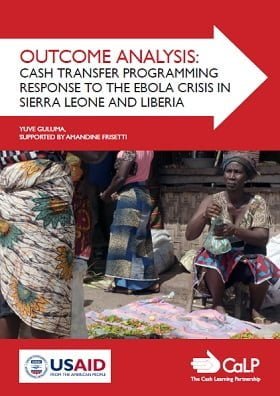
Outcome Analysis: Cash transfer programming response to the Ebola crisis in Sierra Leone and Liberia
Report
The United States Agency for International Development/Food for Peace (USAID/FFP) supported Cash Transfer Programming (CTP) response to the Ebola outbreak in Sierra Leone and Liberia greatly contributed to the recovery of affected communities and households. The CTP response provided a safety net to...
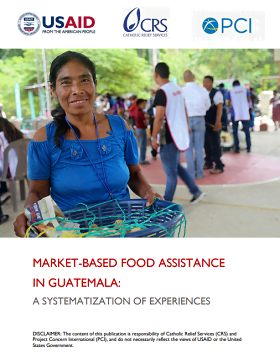
Market-based Food Assistance in Guatemala: A Systematization of Experiences
Guidelines and Tools
In April 2017, at the request of the United States Agency for International Development’s (USAID) Office of Food for Peace (FFP) in Guatemala, Catholic Relief Services (CRS) and Project Concern International (PCI) designed a process to gather and synthesize the experiences of food assistance...
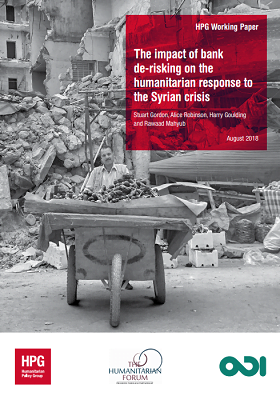
The impact of bank de-risking on the humanitarian response to the Syrian crisis
Report
The Syrian crisis is a complex environment for aid agencies wishing to move funds for humanitarian purposes into the country, or through neighbouring states supporting regional humanitarian efforts. The combination of counter-terrorist financing (CTF) legislation and international sanctions have made it...
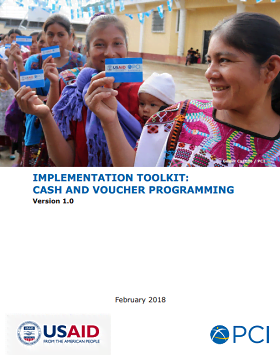
Implementation Toolkit: Cash and Voucher Programming
Guidelines and Tools
This set of tools developed by PCI seeks to harmonize language and approaches for use by teams involved in the design and implementation of cash transfer programs and is not intended to be a complete guide for design and implementation. The tool box focuses on the crucial steps within the program cycle of...
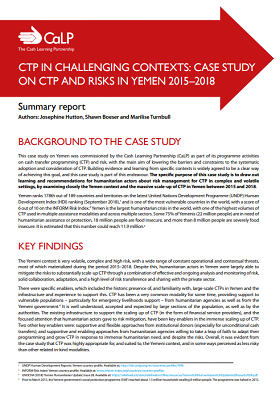
CTP in Challenging Contexts: Case Study on CTP and Risks in Yemen 2015–2018 – Summary
Report
Yemen is one of the most vulnerable countries in the world, and has long suffered from poverty, instability and vulnerability. The conflict, which has unravelled since late 2014, and, more specifically, since March 2015, has left 22 million Yemenis in need of some kind of humanitarian assistance or...

CTP in Challenging Contexts: Case Study on CTP and Risks in Yemen 2015–2018
Report
Yemen is one of the most vulnerable countries in the world, and has long suffered from poverty, instability and vulnerability. The conflict, which has unravelled since late 2014, and, more specifically, since March 2015, has left 22 million Yemenis in need of some kind of humanitarian assistance or...

Cash Transfer Programming in Armed Conflict: The ICRC’s Experience
Report
Money is the main means of survival for most people around the world. That remains the case in situations of armed conflict, when having cash to buy essential goods can mean the difference between life and death.
The ICRC’s experience shows that cash is an essential tool in humanitarian action in armed...

E-Transfer implementation guide
Guidelines and Tools
This updated E-transfer Implementation Guide replaces the original guide published in 2014. In cash transfer programming (CTP), electronic transfers (e-transfers) are a digital replacement for paper vouchers or physical cash. E-transfers are a disbursement mechanism – a way of transferring money, goods...
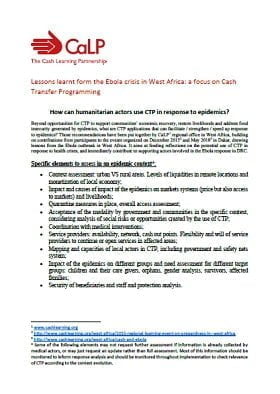
Lessons Learnt from the Ebola Crisis in West Africa: a focus on Cash Transfer Programming
Report
Beyond opportunities for CTP to support communities’ economic recovery, restore livelihoods and address food insecurity generated by epidemics, what are CTP applications that can facilitate / strengthen / speed up response to epidemics? Those recommendations have been put together by the CALP Network...
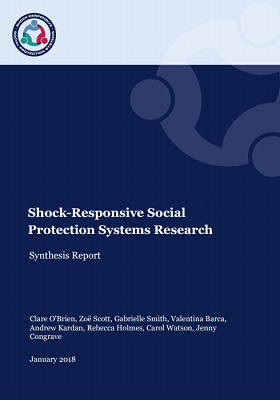
Shock Responsive Social Protection Systems Research: Synthesis Report
Report
This synthesis report consolidates the evidence and lessons learned from the research, drawing on all the case studies and other outputs, including the literature review as well as policy briefs on systems development and monitoring and evaluation. It highlights the key ways in which social protection...
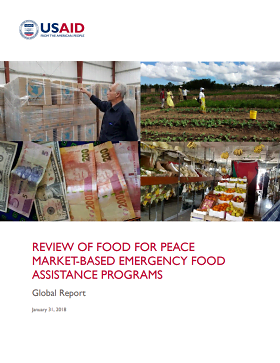
Review of Food for Peace Market-Based Emergency Food Assistance Programs Global Report
Report
Efficient and effective use of humanitarian funds is critical to meet the emergency needs of as many people as possible, especially as emergencies in developing countries have become more numerous, complex, and protracted. The United States Agency for International Development (USAID) Office of Food for...

Review of Food for Peace Market-Based Emergency Food Assistance Programs: Democratic Republic of Congo Case Study Report
Report
The Democratic Republic of Congo (DRC) case illustrates the complexity and diversity of contexts within which program design and implementation occurs. It highlights the need for provincial-scale assessments, local market monitoring, and flexibility to pivot to different modalities depending on changing...

Mainstreaming Gender-Based Violence Considerations in Cash-Based Interventions: A Case Study from Lower Juba, Somalia
Report
This case study provides an overview of assessment and monitoring activities
conducted by the Women’s Refugee Commission and Adeso to mainstream GBV considerations within Adeso’s CBI in Lower Juba.
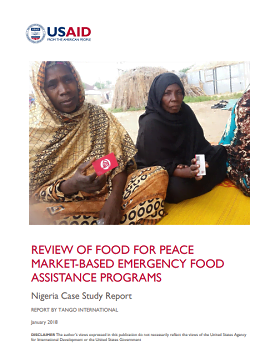
Review of Food for Peace Market-Based Emergency Food Assistance Programs: Nigeria Case Study Report
Case Study
Nigeria is an example of food assistance in a conflict situation in the Sahelian context. The response used information technology to deliver one of the more sophisticated applications of voucher programs. This case is a good example of proactive implementing partner (IP) mechanisms and monitoring systems...
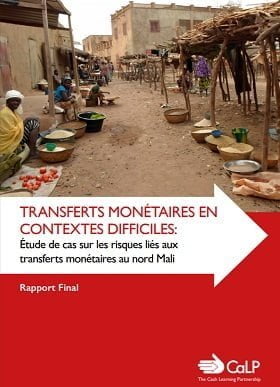
Transferts Monétaires en Contextes Difficiles: Étude de cas sur les risques liés aux transferts monétaires au nord Mali
Rapport
Cette étude de cas a été commanditée par le CALP Network comme première activité de son orientation stratégique 2018-2019 autour des risques liés aux Transferts Monétaires (TM). L’objectif de cette étude est de contribuer à la documentation sur le sujet; et de tirer des enseignements sur...

Mainstreaming Gender-Based Violence Considerations in Cash-Based Interventions: A Case Study from Zinder, Niger
Report
This case study provides an overview of assessment and monitoring activities undertaken by the Women’s Refugee Commission and Save the Children to mainstream gender-based violence (GBV) considerations in Save the Children’s cash-based intervention (CBIs) in Zinder. Key findings, learning and...
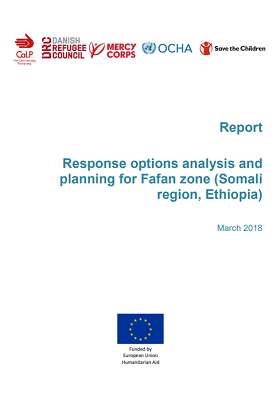
Response options analysis and planning for Fafan zone (Somali region, Ethiopia)
Guidelines and Tools
Between October 2017 and March 2018, the Consortium began the pilot in Ethiopia with the aim of providing technical and strategic support to country-based humanitarian organisations, enabling them to engage in collaborative assessments and decision making. Whilst the Consortium has not been conceived to...
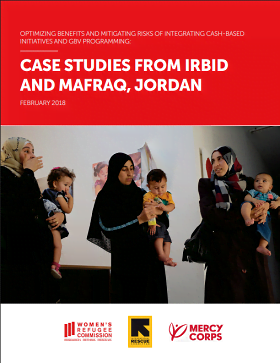
Optimizing Benefits and Mitigating Risks of Integrating Cash-Based Initiatives and GBV Programming: Case Studies from Irbid and Mafraq, Jordan
Report
This case study provides an overview of assessment and monitoring activities
conducted by Mercy Corps and the International Rescue Committee in partnership with the Women’s Commission to:
a. mainstream gender-based violence (GBV) considerations in cash-based interventions
b. utilize cash within a GBV...
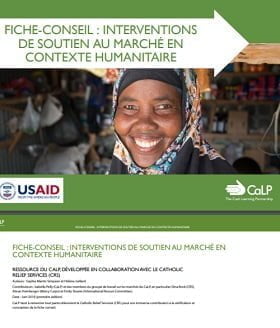
Fiche-Conseil : Interventions de soutien au marché en contexte humanitaire
Guides et outils
La fiche conseil définit le programme de soutien au marché en contexte humanitaire et le décrit dans la pratique. Elle permet aux praticiens humanitaires d’envisager systématiquement des interventions de soutien au marché, parallèlement à d’autres activités du programme. Le champ...

Learning Review: Blockchain Open Loop Cash Transfer Pilot Project
Report
A pilot study of the use of blockchain open loop in cash transfers. The study explores how mobile money through MPESA can be linked to blockchain embracing innovation and improve accountability in Kenya.



